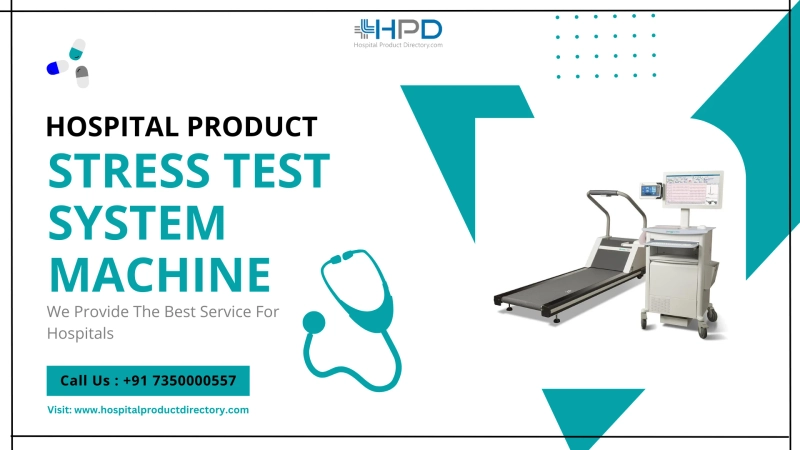Stress testing has become an integral part of healthcare, particularly in hospital settings. It plays a crucial role in diagnosing and monitoring various cardiovascular conditions, such as coronary artery disease and heart rhythm abnormalities. Understanding the importance of stress testing can shed light on its significant benefits in patient care. One of the primary objectives of stress testing is to assess the overall function and performance of the heart under different levels of physical exertion. By subjecting patients to controlled exercise or administering medication, clinicians can induce stress on the heart and closely monitor its response. This helps identify any underlying issues that may not be evident during rest or routine medical assessments. Stress testing provides healthcare professionals with valuable information, such as the presence of blocked arteries, abnormal heart rhythms, and exercise-induced symptoms. This enables them to make accurate diagnoses, develop appropriate treatment plans, and monitor patients' progress over time. Additionally, stress testing can help determine the effectiveness of prescribed medications, guide decisions regarding cardiac interventions, and evaluate overall cardiovascular fitness.
Exploring different types of stress test systemsIn hospital settings, stress test systems made by Stress Test System manufacturers play a crucial role in diagnosing and evaluating various cardiovascular conditions. These systems come in different types, each designed to cater to specific needs and requirements. One common type is the exercise stress test system supplied by Stress Test System Suppliers, which involves monitoring a patient's heart activity while they engage in physical activity, such as walking or running on a treadmill. This test helps healthcare professionals assess the heart's response to exertion and detect any abnormalities. Another type of stress test system is the pharmacological stress test system. This method involves administering medications to mimic the effects of exercise on the heart. It is particularly useful for patients who are unable to physically perform an exercise stress test due to certain limitations. By monitoring the heart's response to these medications, healthcare providers can obtain valuable information about the patient's cardiovascular health. Moreover, there are also advanced stress test systems bought from Stress Test System Dealers that utilize imaging techniques such as echocardiography or nuclear imaging. These systems provide detailed visualizations of the heart and its blood flow during stress testing, enabling healthcare professionals to identify any blockages or abnormalities in the coronary arteries. The benefits of using stress test systems in hospital settings are manifold. Firstly, these systems help in diagnosing and evaluating coronary artery disease, which is a leading cause of heart attacks. By detecting blockages or abnormalities in the heart's blood vessels, healthcare providers can intervene early and implement appropriate treatment strategies. Additionally, stress test systems aid in determining the effectiveness of cardiac treatments and interventions. They allow healthcare professionals to assess the impact of medications, surgeries, or lifestyle changes on the patient's cardiovascular health.
The benefits and applications of exercise stress testsExercise stress tests are a powerful diagnostic tool that has revolutionized the field of cardiology. By subjecting patients to controlled physical exertion while monitoring their heart rate, blood pressure, and overall cardiovascular response, exercise stress tests provide valuable insights into a patient's heart health and can help identify underlying conditions or risks. One of the primary benefits of exercise stress tests is their ability to assess the overall performance and endurance of the cardiovascular system. By pushing the body to its limits in a controlled and monitored environment, these tests can reveal any abnormalities in heart function or blood flow that may not be apparent during rest. This is especially important for individuals who may experience symptoms like chest pain or shortness of breath during physical activity. Exercise stress tests are also crucial for determining a patient's exercise capacity and assessing their risk for future cardiovascular events. By measuring variables such as heart rate, blood pressure, and oxygen consumption during exercise, healthcare professionals can gauge a patient's cardiovascular fitness level and determine if further intervention or lifestyle modifications are necessary.
The benefits and applications of pharmacological stress testsPharmacological stress tests are a powerful tool in the field of medicine, particularly in hospital settings. These tests involve the administration of medications to simulate the effects of physical exercise on the heart. By inducing stress on the cardiovascular system, healthcare professionals can gather crucial information about a patient's heart health and detect any underlying issues. One of the primary benefits of pharmacological stress tests is their versatility and accessibility. Unlike traditional exercise stress tests, which require patients to physically exert themselves, pharmacological stress tests can be performed on individuals who may not be able to exercise due to physical limitations or medical conditions. This makes it a valuable diagnostic tool for patients with mobility issues or those recovering from surgery. Additionally, pharmacological stress tests can provide valuable insights into a patient's cardiac function and help healthcare professionals determine the presence of coronary artery disease or other cardiovascular conditions. The medications used during these tests simulate the effects of exercise by increasing heart rate and blood flow, allowing doctors to assess how well the heart responds to stress. Furthermore, pharmacological stress tests can be tailored to meet the specific needs of individual patients. Different medications can be used depending on the patient's medical history, age, and overall health condition. This customization ensures that the stress test is both safe and effective in providing accurate results.



